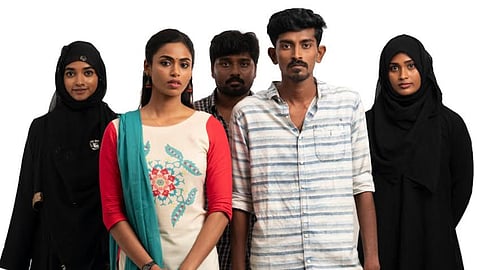

Cinema audiences can be broadly divided into two groups: those seeking entertainment alone and those drawn to the artistic merits of a film as well. The former forms the majority, which means that they expect willing suspension of disbelief, a (super) hero as the protagonist, and a lot of saucy commercial entertainment. For filmmakers who dare to challenge this dynamic with grounded stories featuring unknown actors, the box office odds can be daunting. However, a filmmaker who manages to entertain, while also crafting a relatable film with a subtle yet impactful message, makes a compelling case for supporting such artistic endeavours.
Director: Prasath Ramar
Cast: Senthur Pandian, Preethy Karan
This week Prasath Ramar presents us with one such film, his sophomore effort, Nalla Perai Vaanga Vendum Pilaigale (NPVVP). After making his debut with Siddharth’s Enakkul Oruvan, Prasath is back after 9 years to give us a film about today's youth. NPVVP unfolds over a single day and revolves around the lead characters Ravi (Senthur Pandian) and Arasi (Preethy Karan). It takes more than 20 minutes for us to get into the groove of the film’s setting and characters, but our patience is rewarded eventually.
Despite its 'A' censor certificate, NPVVP steers clear of unwarranted explicitness. The only scene that could be uncomfortable for some is the opening scene where we see a moment of intimacy at a movie theatre. With a man’s sexual aspirations as the central subject, NPVVP tries its hand at adult comedy but it is done in a tasteful manner. It captures the essence of everyday conversations, like the scene where the protagonist asks his friend to buy him male contraceptives, leading to a discussion about sizes — a situation many might find relatable.
Apart from its relatability, the film also stands out with two aspects: its writing and its non-preachy approach. NPVVP is about the miscalculations of young men, and what effect it has on the women in their lives. The casual dialogues, the authentic portrayal of the characters, and how the behaviour of youngsters from Madurai and Mayiladuthurai are shown, make the film unique.
The film's playful banter is punctuated by moments of sharp wit that linger long after the dialogue ends. But beyond clever one-liners, the true highlight is Arasi's scathing takedown of Ravi. While most women characters in films cower when met with consent-less advances from men, Arasi's fierce defiance is a breath of fresh air. She doesn't plead or cry; she holds Ravi accountable with a tongue as sharp as her intellect. This scene, where a woman reclaims her power, is undeniably the film's strongest writing.
A possible weakness of the film would be its lengthy stretches. There are realistic shots of the characters doing day-to-day things like parking a bike, riding said bike for long distances, and wetting their feet at the beach. Such scenes are clearly included for meaningful moments. But after a point, these scenes make even a 115-minute film feel like it will never end. Nevertheless, Pradeep Kumar comes in with his creative background score, to save the day. He masterfully uses the unconventional "pee pee" horn, a child's toy, to punctuate the pregnant pauses. This jarring sound, reminiscent of Nadaswaram's initial notes, cleverly amplifies the protagonist's awkward moments. By transforming an often-annoying noise into a powerful tool, Pradeep elevates the film with his innovative background music.
In the end, Director Prasath Ramar avoids a heavy-handed approach, letting the story resonate with viewers rather than preaching. NPVVP excels with its well-placed callbacks and a nuanced redemption arc for Ravi. Early on, Ravi fiercely defends his sister's character, calling her "nallava" (good) in contrast to Arasi's perceived immorality. However, a later scene throws this perception into question. Instead of resorting to a cliche monologue often seen in commercial films, Ravi grapples with this revelation in quiet reflection. NPVVP’s brilliance is in its subtlety. It doesn't force a singular moral lesson. Each viewer can interpret the film based on their own experiences, yet the underlying message remains the same. Additionally, the film does not blame one gender or character and rather points out that we’re all human at the end of the day.
Tamil cinema often explores either rural or urban life, but Prasath Ramar ventures into fresh territory with Nalla Perai Vaanga Vendum Pillaigale. This film offers a unique perspective on modern relationships in a small-town setting. While the story may not resonate with everyone, particularly those unfamiliar with the social media-driven world of today's youth, it introduces two captivating new actors and leaves a lasting impression. After all, the title itself translates to "seeking a good name," and the film's team are pretty much at the receiving end of one.